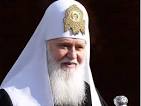Tomos on autocephaly received, UOC-KP to demand recognizing UOC (MP) as non-Ukrainian Church – Patriarch Filaret

![]()
 During his visit to Transcarpathian region, Patriarch Filaret commented on the course and meaning of the Holy Great Council of the Orthodox Churches, which was held from June 16 to 26 in Crete and was attended by 10 of 14 world churches.
During his visit to Transcarpathian region, Patriarch Filaret commented on the course and meaning of the Holy Great Council of the Orthodox Churches, which was held from June 16 to 26 in Crete and was attended by 10 of 14 world churches.
The main purpose of Patriarch Filaret’s arrival was to visit the Maniava Exaltation of the Holy Cross Monastery. It is there that the patriarchal pilgrimage and worship is held every year on July 7, the feast of St. John the Baptist. The number of pilgrims coming to Maniava not only from Ukraine is growing every year.
“This Council had been prepared for over 50 years,” the Patriarch said at the press-conference. “Finally, all the Churches agreed it would happen, although at the request of the Patriarch of Moscow it was moved from Istanbul to Crete for political reasons. Before the Council, all the Churches that had to attend had agreed on the date, venue and draft documents to be reviewed. But Moscow unexpectedly refused to participate. Although it was not the first to announce its refusal. I think that it had instigated other Churches - Bulgarian, Serbian, Antioch, Georgian Orthodox Church, subject to its influence. Subsequently Serbian Church joined the Council. So, Moscow substantiated its absence telling that the Council should be rescheduled to another year. But Ecumenical Patriarch Bartholomew insisted. The Synod convened that decided to hold the Council. So it took place. It adopted all the papers as planned - the definition of autonomy and fasting, marriage and the attitude of the Orthodox Churches thereto. Those Churches that did not participate were also not against the adoption of these documents, but are waiting for another Council.
The Moscow Patriarchate has not said its final word. On July 18, the Moscow Patriarchate will convene the Holy Synod, which will declare its attitude to the past Council.”
Patriarch Filaret believes that such a response of the Russian Orthodox Church and the position of Ecumenical Patriarch Bartholomew on the Council of Orthodox Churches marks the end of the Third Rome, as Moscow has named itself for centuries. Its great influence on the Orthodox world also ended. “The Russian Orthodox Church failed to stop the Patriarch to conduct the Council,” sums up the head of the UOC-KP.
“Therefore it is no longer the Third Rome. Overall, Russia has lost its impact on world politics, although it wanted to take a leading position in the world. And now it is not as strong as the Soviet Union was.”
The question of the Ukrainian Orthodox Church was not discussed by the Council. Although, as Patriarch Filaret said, it was discussed in the corridors. Thus, the general opinion of the leaders of various churches - is not Russia’s concern only, but of all Orthodox, and Patriarch Bartholomew as well. “After all, in its time Kyiv Metropolis was illegally annexed by the Russian Orthodox Church,” said Patriarch Filaret. “Therefore, the ROC does not recognize it now, considering Ukraine its canonical territory. In its turn, Ecumenical Patriarch does not think so, but acknowledges Ukraine its canonical territory. So, he has the right to issue a Tomos granting autocephaly to the Ukrainian Orthodox Church. That is what we are asking it about. The Ukrainian authorities support us in it. The President and the Parliament sent a relevant request to Patriarch Bartholomew. Ukrainian intellectuals gathered more than 5,000 signatures and also submitted them to him. There are also thousands of letters of complaints from the faithful.”
In case we receive the Tomos of autocephaly, the first thing that the UOC-KP would do is required recognizing the Ukrainian Orthodox Church (Moscow Patriarchate) as a non-Ukrainian Church. Further they would have to reregister their parishes as either of the Kyivan Patriarchate or the Russian Orthodox Church. It would be made without pressure.
"In any case, in Ukraine there will be only one Orthodox Church,” the UOC-KP leader summarizes. “It only depends on God when,” Natalia Paliy reported to RISU.









